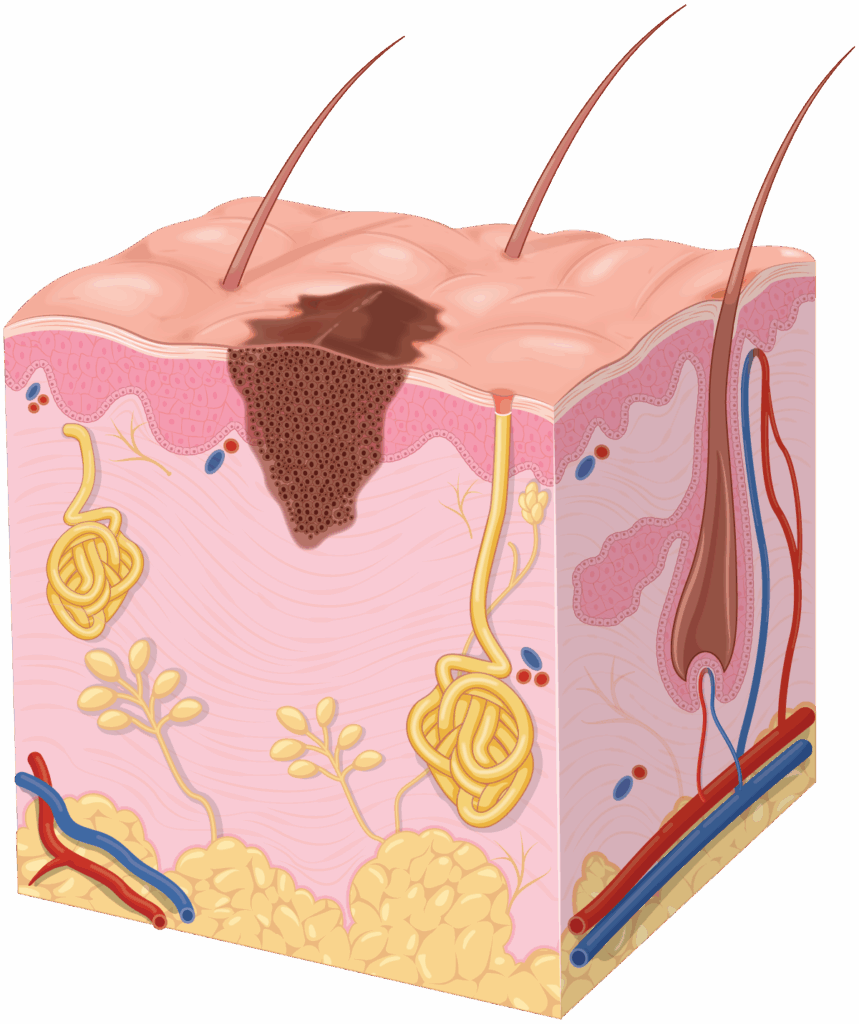Did you know that only 2% of skin cancers come from moles? The other 98% grow on normal-looking skin. A complete skin check by a specialist dermatologist (with dermoscopy) is still the gold standard practice for the most precise skin cancer detection.
Do You Want a Skin Check or a Mole Mapping in NZ?
We get asked this question all the time! The objective way to answer this question is with indisputable facts:
- Only 29.1% of melanomas originate from a pre-existing mole (70.9% from previously normal skin).
- Only 7.6% of skin cancers are melanomas, meaning that…
- 97.8% of skin cancers have nothing to do with a mole whatsoever.
So it is clear that you should get a full skin check and not just focus on mapping your moles. While this is common knowledge amongst dermatologists, it’s not widely known in New Zealand. The references for these facts are listed at the bottom of this page.
Why a Skin Check is Vital
New Zealand has one of the highest reported skin cancer rates in the world. A conservative estimate suggests that over 90,000 New Zealanders are diagnosed with skin cancer every year. However, the actual number is likely much higher due to widespread underdiagnosis and under-reporting.
Early Detection Leads to Much Better Outcomes
The more advanced a skin cancer becomes, the more difficult it is to treat. More advanced skin cancers also have a higher risk of recurring after treatment. In general, the best thing to do is to have your skin cancer detected early, which may avoid the need for surgery altogether. If detected early, skin cancers can be treated by being frozen with liquid nitrogen or sometimes by using a cream like Efudix (fluorouracil) or Aldara (imiquimod).
Why Have a Skin Check at Skintel?
At Skintel, our dermatologists excel at detecting subtle signs of skin cancer. This also allows us to discover early pre-cancerous lesions, which we can often treat with non-invasive treatments, allowing you to avoid invasive surgery.

What Happens During A Skin Check?

The doctor will introduce themselves and ask about your medical history. Some seemingly unrelated health conditions and medicines can raise the risk of skin cancer, so having an accurate history is essential. Bring a list if it’s long! If you have lesions you’re concerned about, this is a good time to ensure the doctor is aware of them. Only qualified dermatologists do skin checks at Skintel. The dermatologist will examine your skin using a dermatoscope to look for various features.
Your Comfort is our Priority
We want to ensure that you are comfortable throughout the process. We are so serious about this that we even had a custom skin-check gown designed and manufactured (in New Zealand) for extra comfort! Chaperones are also available during your check, so please ask.
What if The Dermatologist Finds Something?
Firstly, we realise it can be scary to be diagnosed with skin cancer. We are here for you and will help you through the process. Our experienced dermatologists will discuss the next steps, and you are more than welcome to bring a support person with you. Above all, if you are unsure about anything at any time, please ask questions; we are here for you and want you to feel as comfortable as possible.
Supporting You All The Way Through
At Skintel, we are big believers in self-determination and will always give you reasonable next steps and treatment options. Since you’ve sought our expert opinion, we will also recommend what we think is the best management course. Medicine is not black and white; it’s about treating individuals, not just conditions. Our doctors consider the big picture and won’t push for surgery if it’s unnecessary. We understand that sometimes, quality of life matters more.

Histological Diagnosis

In many cases, our dermatologists instinctively know what a lesion is and may be able to book you directly for treatment. Even if the dermatologist is confident about the diagnosis, we will still offer a biopsy for people who would be more comfortable confirming a histological diagnosis before treatment. In some cases, a biopsy is required to determine the diagnosis, and some insurance companies require skin diagnostics before proceeding to treatment.
Treatment
There are numerous treatments available that the dermatologist will discuss with you. This could include creams, zapping with liquid nitrogen, scraping or surgical removal. Often, lesions don’t need any treatment; in some cases, we may take photos and monitor their progress. If you’d like to know more about treatment options and what is involved with them, take a look at our skin cancer treatment page.

Why is a Skin Cancer Check the Best Practice?
There’s a lot of marketing for skin check and mole mapping software services. These systems can be impressive, but they rely on taking photos to diagnose. If no photo is taken in the first place, the diagnosis will be missed. Most people can spot obvious skin cancers, but these systems struggle with the less obvious ones. Remember, only 2% of skin cancers come from moles; the other 98% can come from seemingly normal-looking skin.
A full skin check with a specialist dermatologist is vital for their vast years of study and tools for gold-standard skin cancer checks for proper detection and treatment. They have the expertise to identify potential issues early and provide the best care tailored to your needs.
Our Ethical Commitment to Thorough Skin Examinations

Detecting a big, black melanoma is important. They stick out like a sore thumb and are hard to miss. However, basal cell carcinomas are about 10 times more common than melanomas. Unfortunately, BCCs are routinely flesh-coloured or pink, can be very subtle, and are commonly missed. Of course, several other types of skin cancers are also flesh-coloured.
Because of this, when people come to us directly for skin cancer removal surgery, we are ethically obliged to encourage a full skin check before the surgery, even if it has already been performed elsewhere. We don’t charge extra for this; we simply want to ensure you have had a skin check that meets our standards.
Importance of High Sensitivity in Skin Checks
Variations of skin checks go by many names, such as mole mapping, skin cancer check, spot check, or mole check. In NZ, these all refer to a check of your skin to detect skin cancers. There are two types of tests in medicine: a screening test and a diagnostic test. A skin check falls into the category of a screening test, and to be worthwhile, a screening test has to be highly sensitive. “High sensitivity” is a statistical concept that describes a test with a low false negative rate, meaning it misses very few skin cancers.
False Reassurance is The Worst Outcome
For a screening test, the worst outcome is being falsely reassured: to be told there is no skin cancer when there actually is. The falsely reassured person would go about their life oblivious and would not get re-checked as they have been (incorrectly) reassured. While no test or procedure is 100% accurate in medicine, when you get a skin check, you want to ensure that it has high sensitivity.
Frequently Asked Questions
Insurance companies usually do not cover a general skin check or mole map in Auckland. Many insurance companies require skin checks or skin lesion appointments with a specialist dermatologist rather than with a GP or non-specialist doctor with an interest in skin cancer (GPSI). While we cannot comment on individual policies, check with your provider to see if they will cover a full skin check with a dermatologist.
Skintel is an affiliated provider with NIB and Southern Cross health insurance.
It is difficult to give a blanket recommendation for everyone – it could range from three-monthly to no recommendation at all. Your dermatologist will discuss this during your appointment. We have an article explaining the factors that inform our recommendations. This could include a personal or family history of skin cancer, having many moles, or background medical conditions.
Dermatologists are well known to be the most accurate at diagnosing skin cancers, which has been repeatedly demonstrated in numerous studies. Researchers know dermatologists are experts at skin cancer, so they use dermatologists to validate their artificial intelligence platform for skin cancer, and some have proudly endorsed their platforms at the dermatologist level.
We are also constantly keeping up to date with leading-edge medical research on treatments that may reduce or slow down the development of skin cancer.
References
- Esteva, A., Kuprel, B., Novoa, R. A., Ko, J., Swetter, S. M., Blau, H. M., & Thrun, S. (2017). Dermatologist-level classification of skin cancer with deep neural networks. Nature, 542(7639), 115–118. doi: 10.1038/nature21056
- Bangash, HK. Ibrahimi, OA. Lawrence, JG. et. al. Who Do You Prefer? A Study of Public Preferences for Health Care Provider Type in Performing Cutaneous Surgery and Cosmetic Procedures in the United States. Dermatol Surg. 2014;40(6):671-8. doi: 10.1111/dsu.0000000000000016
- Pampena R, Kyrgidis A, Lallas A, et al. A meta-analysis of nevus-associated melanoma: Prevalence and practical implications. J Am Acad Dermatol 2017; 77:938. doi: 10.1016/j.jaad.2017.06.149
- Cancer Society. Skin cancer: Facts and Figures, 2022, from www.sunsmart.org.nz/skin-cancer/facts-and-figures

